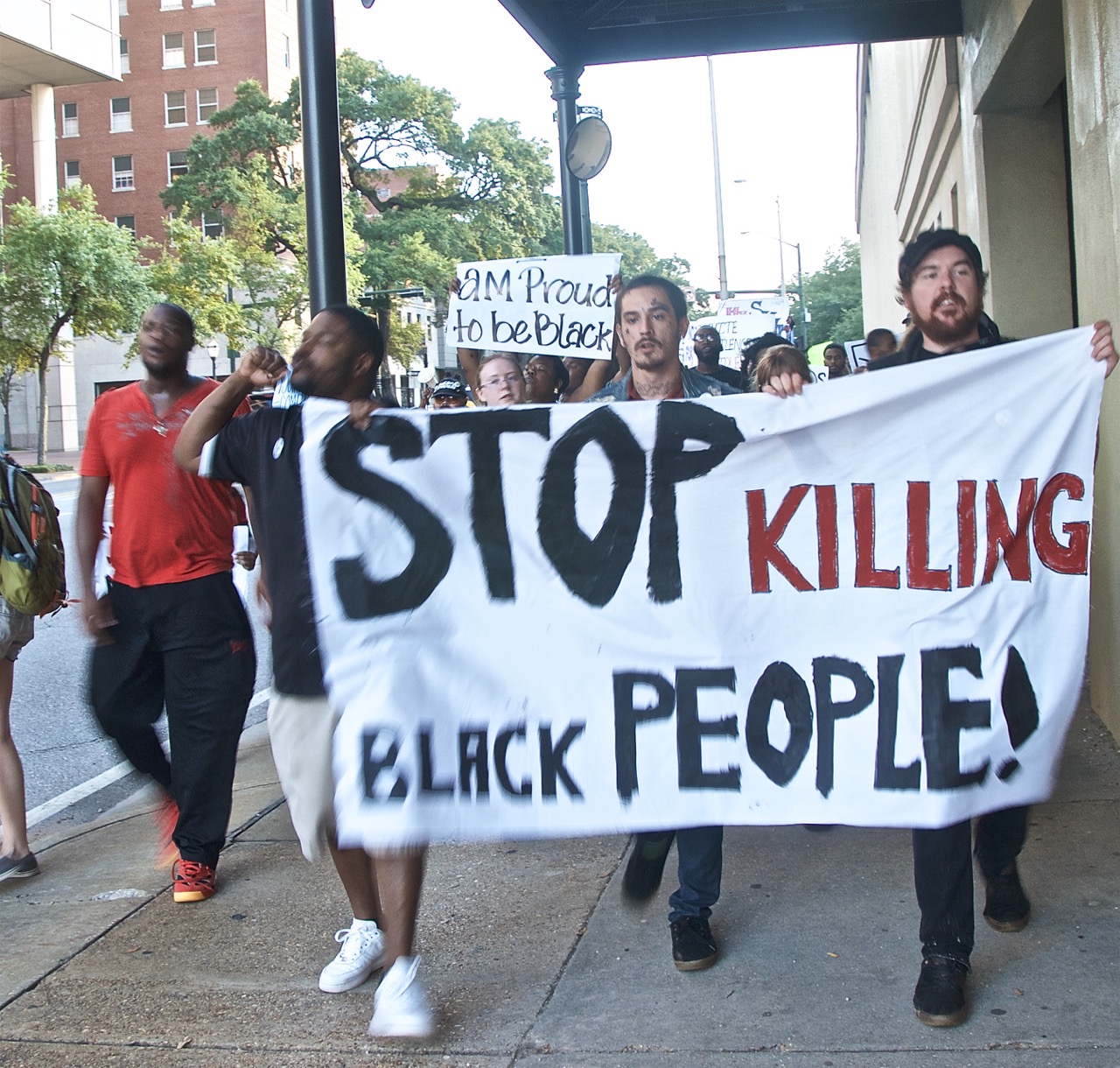
Protesters march for justice in Mobile, Alabama: Glynn Wilson
By John L. Micek –

John Micek, Editorial and Opinions Editor for PennLive/The Patriot-News: Joe Hermitt
A couple of years back, when I was driving down to Florida, I got pulled over on U.S. Route 301 in a little town called Waldo near Gainesville.
It was late – past 2 a.m. — and I was pretty sure I wasn’t speeding. So when the dome lights of an Alachua County cruiser flashed to garish life in my rearview mirror, I had no idea what was happening.
As it turned out, not only was I speeding, I was clocking in around 55 mph in a 35 mph zone. I was befuddled and polite. So, taking pity on the exhausted Yankee, even as he slapped me with a wince-inducing fine, the deputy gave me an alternate route to Interstate 75 so I could avoid his ticket-writing brethren.
Not once did I worry that I wouldn’t come out of the encounter alive. Not once did I fear for my safety.
Then again, I’m a white guy in my 40s.
Now consider the experiences of two of my PennLive colleagues, Jamar Thrasher and Rhonda Mays, both of whom are black, that are the complete opposite of my own.
Thrasher found himself at the business end of a patrol officer’s service weapon when he tried to report a tutu-wearing lost dog that he’d found on a Pittsburgh street.
Thrasher, in a peacoat and dress clothes, had his hands in his pockets on a cold January night – which made the young, white officer he talked to a tad jumpy.
“I tried reporting [the incident]. I called 911, but they said I had approached a police officer with my hands in my pockets,” he recalled. “I thought I was being a good citizen. This interaction made me more cautious when interacting with law enforcement.”
Mays said she found herself frequently stopped for phantom car problems when she was living and working in Washington D.C. and its suburbs.
“I was repeatedly pulled over, usually for something like ‘You have a burned out tail light,'” she said. “That reason is particularly frustrating because there is no way to prove the reason is true or not at the time. I had even had the tail light checked by a mechanic to make sure it wasn’t going off and on, and found it was fine.”
The experiences, she said, which sometimes involved her sitting on the curb with her hands behind her back, were “very humiliating,” she said.
“One wrong move, such as not laying completely still, not placing both hands on the steering wheel as soon as the stop ensues or reaching in a glove compartment or jacket pocketfor I.D. could be the end of your life,” Mays said. “Most of us in the [African-American] community recognize these realities.”
I don’t know what that’s like. I likely never will. So when I hear people (always white) say, “Well, it never would have happened if he’d just obeyed police commands,” it just rings hollow, especially after what happened last week in Baton Rouge and St. Paul.
“I don’t know what to do anymore. I don’t know how to allow myself to feel grief and outrage while also thinking about change,” Roxane Gay wrote in The New York Times last week. “I don’t know how to believe change is possible when there is so much evidence to the contrary. I don’t know how to feel that my life matters when there is so much evidence to the contrary.”
And I don’t know how that kind of desperation feels when there’s a new headline, seemingly every few weeks, about a black a person whose run-in with a police officer turns fatal.
I never will. And if you’re white and reading this, you probably never will either.
In June, U.S. Supreme Court Justice Sonia Sotomayor wrote in heart-rending terms, about what it’s like to be a person of color and to deal with law enforcement.
“We must not pretend that the countless people who are routinely targeted by police are ‘isolated,'” she wrote. “They are the canaries in the coal mine whose deaths, civil and literal, warn us that no one can breathe in this atmosphere. They are the ones who recognize that unlawful police stops corrode all our civil liberties and threaten all our lives. Until their voices matter too, our justice system will continue to be anything but.”
And that’s why we need to listen – harder than ever now.
—
John L. Micek is an award-winning political journalist, Opinion Editor and Political Columnist for PennLive/The Patriot-News in Harrisburg, Pa. Copyright © 2016 John L. Micek, distributed by Cagle Cartoons newspaper syndicate.













